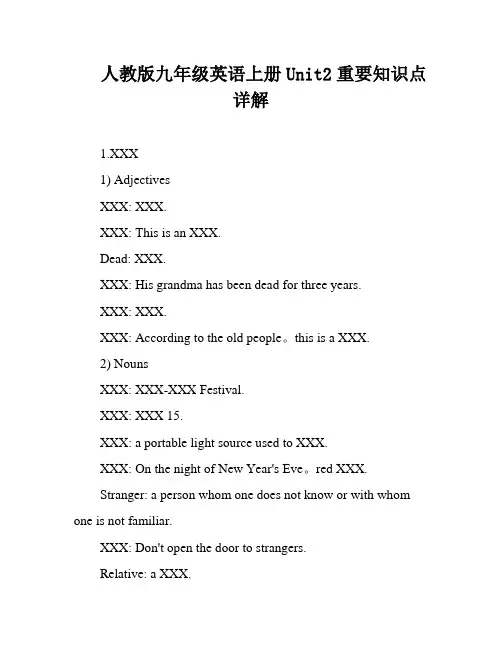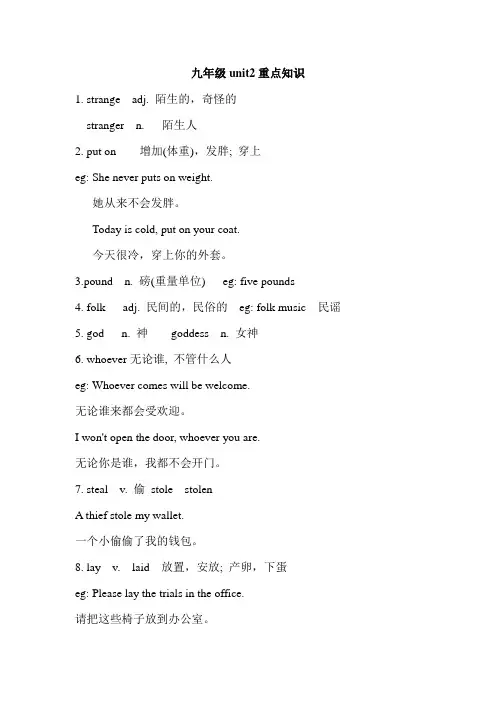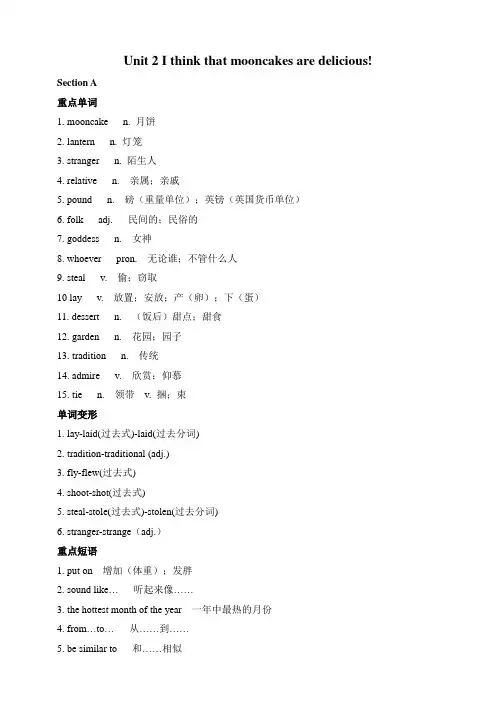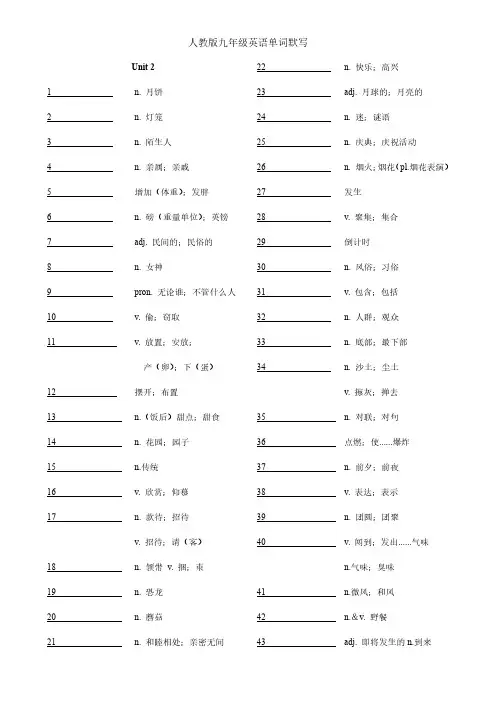人教版九年级英语unit2
- 格式:ppt
- 大小:3.57 MB
- 文档页数:31

人教版英语九年级全一册unit2笔记以下是Unit 2的课堂笔记,包括了重要单词、短语、句型以及语法知识点:Unit 2 重要单词:1. adj. 疲倦的:tired2. v. 放松:relax3. adj. 焦虑的:anxious4. v. 害怕:fear5. n. 经验:experience6. v. 欣赏:appreciate7. n. 机会:opportunity8. v. 实现:achieve9. n. 目标:goal10. v. 挑战:challengeUnit 2 重要短语:1. take a deep breath 深呼吸2. hold my hand 握住我的手3. calm down 冷静下来4. get butterflies in my stomach 心头鹿撞5. worry about 为...担心6. be nervous about 对...感到紧张7. be anxious about 对...感到焦虑8. be scared of 对...感到害怕9. look forward to 盼望,期待10. in the future 在未来Unit 2 重要句型:1. I feel tired these days. (现在时态,描述当前状态)2. I was really nervous before the big speech. (过去时态,描述过去发生的动作)3. I will challenge myself to do things I didn't think I could do before. (将来时态,描述将来的动作)4. It's important to learn how to deal with stress. (形式主语,强调某事的重要性)5. I look forward to hearing from you. (固定句型,表示期待)6. I have a goal to achieve. (动词不定式作后置定语,表示目标)7. It's a waste of time doing sth. (动名词作主语,表示某事是浪费时间)8. I'm sorry to hear that you're feeling down. (固定句型,表示同情或安慰)9. The best way to relax is through exercise. (动词不定式作后置定语,表示放松的最好方式)10. I will try my best to get the job. (动词不定式作目的状语,表示努力) Unit 2 语法知识点:1. 现在完成时态(Present Perfect Tense):用于描述过去发生的动作对现在的影响或结果。

九年级英语unit2单词表人教版Unit 2 I think that mooncakes are delicious!一、名词(n.)1. lantern ['læntən] 灯笼;提灯。
2. stranger ['streɪndʒə(r)] 陌生人。
3. relative ['relətɪv] 亲属;亲戚。
4. pound [paʊnd] 磅(重量单位);英镑(英国货币单位)5. dessert [dɪ'zɜ:t] (饭后)甜点;甜食。
6. garden ['ɡɑ:dn] 花园;园子。
7. tradition [trə'dɪʃn] 传统。
8. tie [taɪ] 领带 v. 捆;束。
9. haunted ['hɔ:ntɪd] 有鬼魂出没的;闹鬼的。
10. ghost [ɡəʊst] 鬼;鬼魂。
11. trick [trɪk] 花招;把戏。
12. treat [tri:t] 款待;招待 v. 招待;请(客)13. spider ['spaɪdə(r)] 蜘蛛。
14. Christmas ['krɪsməs] 圣诞节。
15. fool [fu:l] 蠢人;傻瓜 v. 愚弄 adj. 愚蠢的。
16. lie [laɪ] (lay [leɪ], lain [leɪn])存在;平躺;处于。
17. novel ['nɒvl] (长篇)小说。
18. eve [i:v] 前夕;前夜。
19. bookstore ['bʊkstɔ:(r)] 书店。
20. dead [ded] 死的;失去生命的。
21. business ['bɪznəs] 生意;商业。
22. punish ['pʌnɪʃ] 处罚;惩罚。
23. warn [wɔ:n] 警告;告诫。
24. present ['preznt] 现在;礼物 adj. 现在的。


人教版九年级英语上册Unit 2单词及重点短语(附例句)Unit2 I think that mooncakes are delicious!【重点单词】1.Mooncake ['mu:nkeɪk] n. 月饼△The moon cake made by grandma is delicious!奶奶做的月饼味道美极了。
△People gather around the table to eat moon cakes and enjoy the moon on the 15th of August every year.每年8月15日,人们围坐在桌子旁吃月饼,赏月。
ntern [ˈlæntə(r)n] n. 灯笼△Red lanterns are hung on both sides of the street on the Lantern Festival. 元宵节的时候,街道两旁都挂着红灯笼。
3.stranger [ˈstreindʒə(r)] n. 陌生人△Don't talk to strangers.不要和陌生人说话。
△How many strangers have come to our community today?今天有多少陌生人来到我们的社区?4.relative [ˈrelətiv] n. 亲属;亲戚△On the first day of new year's day, our parents took us to visit relatives. 在元旦的第一天,我们的父母带我们去拜访亲戚。
5.put on 增加(体重);发胖△During the outbreak, many people put on a lot of weight. 在疫情爆发期间,很多人的体重都增加了很多。
6.pound [paund] n. 磅(重量单位);英镑△Grace has 500 pounds.格蕾丝有500英镑。

Unit 2 I think that mooncakes are delicious!Language points and summary1. stranger n. 陌生人(可数名词)strange adj. 陌生的,奇怪的e.g. Don’t talk to strangers. 不要和陌生人说话。
There is nothing strange in the room. 房间里没有奇怪的东西。
2. relative n. 亲属,亲戚(可数名词)e.g. They have a lot of relatives. 他们有许多亲戚。
3. put on 增加(体重);发胖;穿上e.g. They’ve put on five pounds. 他们体重增加了5磅。
It’s cold outside. Please put on your coat. 外面冷,请穿上大衣。
4. pound n. 磅;英镑(可数名词)e.g. The desk weighs 5 pounds. 这张课桌重5磅。
5. People go on the streets to throw water at each other.throw at 抛向;泼向;洒向动词throw后接所投掷的物体,用介词at引入泼洒的对象。
e.g. On our way here, someone threw a stone at our car, but fortunately wewere not hit.在我们来的路上,有人向我们的车投掷石块,所幸的是我们没被砸中。
It’s the first snow of the year, and the children are happily throwing snowballs at each other.这是今年的第一场雪,孩子们高兴地拿雪球相互抛着。
1. Chinese people have been celebrating Middle-Autumn Festival andenjoying mooncakes for centuries.for centuries 几百年2. They carry people’s wishes to the families they love and miss.它们把人们的祝愿带给他们热爱和想念的家人。

人教版九年级英语Unit2单词和词组Unit 2单词讲解1. 1)used to do 过去常常做(只用于过去时) He used to run in the morning.2) be used to do 被用作…Pens are used to write.Coats are used to keep out the cold.3) be used to doing / get used to doing 习惯于做… He is used to getting up early.We are used to hearing his songs after class. 2. be terrified of =be afraid of3. go to sleep = get to sleep = fall asleep(表动作)be asleep(表状态)4. on 开着的Mr Green must be at work. Look! The light in his office is still on.5. chat – chatted – chatting6. daily (= everyday) adj. – day n. daily life / work / activity7. v. die – n. death – adj. dead – died – dyingdie (终止v.) – be dead (延续v.)8. cause trouble 惹麻烦 / cause an accident 引起事故 9. patient (adj. / n. 病人) – patience (n.) be patient with sb. 对某人有耐心be patient of sth. 对某事有耐心be patient to do sth. 耐心做某事10. in the end = at last / finally11. make a decision to do sth. = decide to do sth. 下决心做某事,决定做某事12. to one’s surprise / joy / disappointment 令某人惊讶/高兴/失望的是……13. even though = even if14. no longer = not … any longerThey no longer worked there. = They didn’t work there any longer.15. take pride in = be proud of 对……感到自豪;为……而骄傲 16. pay attention to + n. /代词/ v.ingPlease pay attention to your pronunciation.You should pay attention to spelling.17. give up + n. / v.inggive it / them upFor your health, you must give up smoking.Never give up your dreams!18. waste1) v. We mustn’t waste our time.He always wastes time playing computer games.2) n. I think it is just a waste of time playing computer games. 3) adj. This old man makes a living by collecting waste things.。

人教版九年级英语上册Unit2重要知识点详解1.XXX1) AdjectivesXXX: XXX.XXX: This is an XXX.Dead: XXX.XXX: His grandma has been dead for three years.XXX: XXX.XXX: According to the old people。
this is a XXX.2) NounsXXX: XXX-XXX Festival.XXX: XXX 15.XXX: a portable light source used to XXX.XXX: On the night of New Year's Eve。
red XXX.Stranger: a person whom one does not know or with whom one is not familiar.XXX: Don't open the door to strangers.Relative: a XXX.XXX: His XXX.Goddess: a XXX.XXX: Chang'e is a goddess in the Moon Palace.Dessert: a sweet course served at the end of a meal.XXX: Children like to have XXX.XXX: a piece of ground where flowers。
vegetables。
or fruit are grown.XXX: There are all kinds of XXX.XXX: a long。
narrow piece of cloth worn around the neck.XXX: XXX.Ghost: an n of a dead person.XXX: This is a story about ghosts.XXX: a XXX.XXX: Boys like to play tricks.Treat: an event or item that is out of the ordinary and gives great pleasure.XXX: We were treated to a XXX XXX.二、【重点句型】1.It's said that。

九年级unit2重点知识1. strange adj. 陌生的,奇怪的stranger n. 陌生人2. put on 增加(体重),发胖; 穿上eg: She never puts on weight.她从来不会发胖。
Today is cold, put on your coat.今天很冷,穿上你的外套。
3.pound n. 磅(重量单位) eg: five pounds4. folk adj. 民间的,民俗的eg: folk music 民谣5. god n. 神goddess n. 女神6. whoever无论谁, 不管什么人eg: Whoever comes will be welcome.无论谁来都会受欢迎。
I won't open the door, whoever you are.无论你是谁,我都不会开门。
7. steal v. 偷stole stolenA thief stole my wallet.一个小偷偷了我的钱包。
8. lay v. laid 放置,安放; 产卵,下蛋eg: Please lay the trials in the office.请把这些椅子放到办公室。
The hens lay eggs every day.这些母鸡每天下蛋。
9. lay out 摆开, 布置10. tradition n. 传统traditional adj. 传统的traditionally adv. 传统地a tradition of... ...的传统11. admire v. 欣赏, 仰慕, 钦佩eg: I admire her.12. tie n. 领带v. 捆, 绑eg: He always wears a tie.They tie the bad man to a tree.13. trick n. 花招, 把戏play a trick on sb 戏弄某人14. treat n. 款待,招待; v. 招待, 请客eg: Thanks for your treat.15. lie v. 存在, 平躺, 处于eg: Hai Nan lies in the south of China.海南位于中国南部。

人教版九年级英语上册Unit 2单词及重点短语(附例句)Unit2 I think that mooncakes are delicious!【重点单词】1.Mooncake ['mu:nkeɪk] n. 月饼△The moon cake made by grandma is delicious!奶奶做的月饼味道美极了。
△People gather around the table to eat moon cakes and enjoy the moon on the 15th of August every year.每年8月15日,人们围坐在桌子旁吃月饼,赏月。
ntern [ˈlæntə(r)n] n. 灯笼△Red lanterns are hung on both sides of the street on the Lantern Festival. 元宵节的时候,街道两旁都挂着红灯笼。
3.stranger [ˈstreindʒə(r)] n. 陌生人△Don't talk to strangers.不要和陌生人说话。
△How many strangers have come to our community today?今天有多少陌生人来到我们的社区?4.relative [ˈrelətiv] n. 亲属;亲戚△On the first day of new year's day, our parents took us to visit relatives. 在元旦的第一天,我们的父母带我们去拜访亲戚。
5.put on 增加(体重);发胖△During the outbreak, many people put on a lot of weight. 在疫情爆发期间,很多人的体重都增加了很多。
6.pound [paund] n. 磅(重量单位);英镑△Grace has 500 pounds.格蕾丝有500英镑。

Unit 2 I think that mooncakes are delicious! Section A重点单词1. mooncake n. 月饼2. lantern n. 灯笼3. stranger n. 陌生人4. relative n. 亲属;亲戚5. pound n. 磅(重量单位);英镑(英国货币单位)6. folk adj. 民间的;民俗的7. goddess n. 女神8. whoever pron. 无论谁;不管什么人9. steal v. 偷;窃取10 lay v. 放置;安放;产(卵);下(蛋)11. dessert n. (饭后)甜点;甜食12. garden n. 花园;园子13. tradition n. 传统14. admire v. 欣赏;仰慕15. tie n. 领带v. 捆;束单词变形1. lay-laid(过去式)-laid(过去分词)2. tradition-traditional (adj.)3. fly-flew(过去式)4. shoot-shot(过去式)5. steal-stole(过去式)-stolen(过去分词)6. stranger-strange(adj.)重点短语1. put on 增加(体重);发胖2. sound like…听起来像……3. the hottest month of the year 一年中最热的月份4. from…to…从……到……5. be similar to 和……相似6. throw…at…朝……扔……7. wash away 冲洗掉8. in the shape of…以……的形状9. carry sth. To sb. 把某物带给某人10. shoot down 射掉11. plan to do sth. 计划做某事12. refuse to do sth. 拒绝做某事13. fly up to…飘向……14. call out one’s name to…对着……喊出某人的名字15. lay out 摆弄;布置16. share…with…和……分享……17. come/ be/ get back 回来18. give sth. To sb. 给某人某物19. take sb. Out for dinner 带某人出去吃饭20. help(to) do sth. / help with sth. 帮助做某事重点句型1.比尔想知道他们明年是否可以再吃到粽子。

人教版九年级英语单词默写
Unit2
1n.月饼
2n.灯笼
3n.陌生人
4n.亲属;亲戚
5增加(体重);发胖
6n.磅(重量单位);英镑7adj.民间的;民俗的
8n.女神
9pron.无论谁;不管什么人10v.偷;窃取
11v.放置;安放;
产(卵);下(蛋)
12摆开;布置
13n.(饭后)甜点;甜食
14n.花园;园子
15n.传统
16v.欣赏;仰慕
17n.款待;招待
v.招待;请(客)
18n.领带v.捆;束
19n.恐龙
20n.蘑菇
21n.和睦相处;亲密无间22n.快乐;高兴
23adj.月球的;月亮的
24n.迷;谜语
25n.庆典;庆祝活动
26n.烟火;烟花(pl.烟花表演)27发生
28v.聚集;集合
29倒计时
30n.风俗;习俗
31v.包含;包括
32n.人群;观众
33n.底部;最下部
34n.沙土;尘土
v.擦灰;掸去
35n.对联;对句
36点燃;使......爆炸
37n.前夕;前夜
38v.表达;表示
39n.团圆;团聚
40v.闻到;发出......气味
n.气味;臭味
41n.微风;和风
42n.&v.野餐
43adj.即将发生的n.到来。
人教版九年级英语上册Unit2重要知识点详解+练习一、【重点词汇】1. 重点单词(1)形容词folk民间的;民俗的This is an interesting folktale.这是一个有趣的民间传说。
dead死的;失去生命的His grandma has been dead for three years. 他的祖母已经去世三年了。
hunted有鬼魂出没的;闹鬼的According to the old people, this is a haunted place for ghosts. 据老人说,这是鬼魂出没的地方。
(2)名词mooncake月饼People are eating moon cakes and enjoying the moon on August 15.人们在八月十五吃月饼、赏月。
lantern灯笼On the night of new year's Eve, red lanterns are hung everywhere in the street.stranger陌生人Don't open the door to strangers.relative亲属;亲戚His relatives came to see her yesterday.goddess女神Chang'e is a goddess in the Moon Palace.嫦娥是月宫里的女神。
dessert (饭后)甜点;甜食Children like to have sweets after meals.孩子们饭后喜欢吃甜食。
garden花园;园子There are all kinds of flowers in the garden.花园里有各种各样的花。
tie领带I bought dad a beautiful tie as a birthday present.我给爸爸买了一条漂亮的领带作为生日礼物。
九年级上册英语unit2知识点人教版九年级上册英语Unit 2知识点九年级上册英语Unit 2是一个重要的学习单元,它涵盖了很多基本的英语知识点,帮助学生在英语学习中建立坚实的基础。
本文将围绕Unit 2的知识点进行讲解,帮助大家更好地理解和掌握。
主题1: 常见的英语固定搭配Unit 2中包含了许多常见的英语固定搭配,如"make a speech","take a chance"等。
这些固定搭配在英语中使用非常普遍,掌握它们对于学生的口语表达和写作能力有极大的帮助。
主题2: 介词的用法介词是英语中一个重要的语法点,它用来表示人、物、地点、时间等之间的关系。
在Unit 2中,学生需要掌握一些常见介词的用法,如"in","on","at"等。
同时,介词的用法也需要注意一些固定搭配,如"at the end of","in the middle of"等。
主题3: 定语从句的构成和用法定语从句在英语中起到修饰名词的作用,使句子更加精确和具体。
在Unit 2中,学生需要学会如何构成定语从句,并且掌握一些常见的关系代词和关系副词的用法,如"which","where","when"等。
主题4: 情态动词的用法情态动词是英语中非常常见的一种动词形式,它用来表示说话人对行为、态度和能力的判断和推测。
在Unit 2中,学生需要学会如何正确使用情态动词,如"can","could","should"等。
同时,情态动词的否定形式和疑问形式也需要掌握。
主题5: 名词的单复数形式名词的单复数形式是英语中一个基本的语法点,但是在实际应用中常常会出现错误。
在Unit 2中,学生需要学会名词的单复数形式以及一些不规则名词的变化规律。
人教版九年级英语unit2知识归纳人教版九年级英语unit2知识1Mooncake['mu:nke?k]n.月饼lantern[?l?nt?(r)n]n.灯笼stranger[?streind??(r)]n.陌生人relative[?rel?tiv]n.亲属;亲戚puton增加(体重);发胖pound[paund]n.磅(重量单位);英镑folk[f?uk]adj.民间的;民俗的goddess[?g?des][?ɡɑd?s]n.女神whoever[hu:?ev?pron.无论是谁;不管谁;任何人steal[sti:l]v.(stole[st?ul],stolen[st?ul?n])偷;窃取lay[lei]v.(laid[leid],laid)放置;产(卵)layout摆开;布置dessert[di?z?:(r)t]n.(饭后)甜点;甜食garden[ga:(r)dn]n.花园;园子tradition[tr??d??n]n.传统admire[?d?mai?(r)]v.欣赏;仰慕tie[tai]n.领带v.捆;束haunted[?h?:ntid]adj.有鬼魂出没的ghost[g?ust]n.鬼;鬼魂trick[trik]n.花招;把戏treat[tri:t]n.款待;招待;请客spider[?spaid?r)]n.蜘蛛Christmas[?krism?s]n.lie[laI]v.(lay[leI],lain[leIn])存在;平躺;处于novel[?n?vl][?na:vl]n.(长篇)小说eve[i:v]n.(尤指宗教节假日的)前夕;前夜dead[ded]adj.死的;失去生命的business[?bizn?s]n.生意;商业punish[?p?nis]v.处罚;惩罚warn[w?:(r)n]v.警告;告诫endup最终成为;最后处于present[preznt]n.现在;礼物adj.现在的nobody[n?ub?di][n?uba:di]pron.没有人warmth[w?:(r)mθ]n.温暖;暖和spread[spred]v.传播;展开n.蔓延;传播Macao[m??kau]澳门ChiangMai[?t?i?n?maI],[d?a:nmaI]清迈(泰城市)WaterFestiwal泼水节Mid-AutumnMother'sDayFather'sDayHalloween[?h?l?u?i:n]前夕AChristmasCarol《圣诞欢歌》(小说名)Easter复活节Clara[?kla:r?][?kler?]克拉拉(女名)Santa[?s?nt?]Claus[kl?:z]圣诞老人Charles[t?a:(r)lz]Dickens[?dik?nz]查尔斯?狄更斯(英)Scrooge[skru:d?]斯克鲁奇n.(非正式)吝啬鬼Jacob[?d?eik?b]Marley[?ma:(r)li]雅各布?马利人教版九年级英语unit2知识2知识梳理【重点】1.puton增加(体重);发胖2.careabout关心;在乎endup最终成为,最后处于notonly……butalso……不但……而且……5.shootdown射下edtodo过去常常做……7.remindsb.of使某人想起8.giveout分发发放thewaterfestival泼水节theChinesespringfestival中国11.nextyear明年12.soundlike听起来像13.eachother互相彼此19.asaresult结果因此20.Mother’sday母亲节21.moreandmorepopular越来越受欢迎22.thinkof想起;认为;思考dressup装扮穿上盛装theimportanceof……的重要性25.makemoney挣钱26.inneed需要帮助处于困境中27.between…and…在……和……之间28.thedragonboatfestival龙舟节29.thelanternfestival30.likebest最喜欢31.goto…foravacation去……度假32.besimilarto与……相似washaway冲走洗掉Mid-autumnfestival中秋节35.shootdown射下36.callout大声呼喊37.thetraditionof……的传统38.atnight在夜里;在晚上one…,theother…一个……,另一个…...Father’sday父亲节【重点句型】1.Ithinkthatthey’refuntowatch.我认为它们看着很有意思。
人教版九年级上册英语unit2知识点九年级上册英语Unit 2 知识点探究九年级上册的英语课程给学生们带来了更多的挑战,Unit 2更是如此。
在这个单元中,学生将学习有关健康生活方式的话题,并了解有关饮食、运动和习惯的表达。
下面我们将对Unit 2的主要知识点进行探究。
1. 基本运动动词:在Unit 2中,学生将学习一些基本的运动动词,如run(跑)、walk(走)、swim(游泳)等。
这些动词用于描述人们进行体育运动或日常活动的行为。
学生在学习这些动词时,还可以通过与其他学生一起进行小组活动或角色扮演来巩固所学知识。
2. 健康生活方式的表达:在Unit 2的课程中,学生将学习如何用英语表达健康生活方式。
他们将学习一系列有关食物和饮食的词汇,如meat(肉类)、fruit(水果)等。
此外,他们还会学习如何表达自己的饮食习惯,比如"I eat a balanced diet."(我吃均衡的饮食)。
通过学习这些表达方式,学生将能够更好地理解和交流与健康生活方式相关的话题。
3. 健康生活建议的表达:学生在Unit 2中还将学习如何给予健康生活建议。
他们将学习一些与建议相关的动词和词组,如should(应该)、need to(需要)等。
通过学习这些表达方式,学生将能够更好地给予他人关于健康生活方式的建议。
4. 过去式的构成和运用:在Unit 2的课程中,学生还将学习过去式的构成和运用。
他们将学习一些日常动词的过去式形式,并了解一些表示过去的时间状语词,如yesterday(昨天)、last week(上周)等。
通过学习这些知识,学生将能够更好地描述过去的事件和经历。
5. 祈使句的构成和运用:在Unit 2中,学生将学习祈使句的构成和运用。
他们将学习如何用祈使句来给予他人命令、建议或请求,比如"Take some exercise."(做些运动。
)或"Don't eat too much junk food."(不要吃太多垃圾食品。
人教版新目标英语9年级全册讲解-Unit 2Unit 2 I used to be afraid of the dark.重点、难点、考点及疑点注释1. Over here! Don’t you remember me? (P11)过来!你不记得我了吗?(1)over here相当于come over here,意为“过来”。
(2) remember的反义词是forget,两者用法相同,后面可跟名词,动名词或动词不定式。
◎remember/forget doing sth表示“记得/忘记做过某事”,强调事情已经做了。
I remember posting your letter. 我记得替你寄过信了。
They forget locking the door. 他们忘记锁过门了。
◎remember/forget to do sth表示“记得/忘记去做某事”,强调事情还未做。
I remember to post your letter. 我记得替你寄信。
They forget to lock the door. 他们忘了锁门。
2. Y ou’re Paula, aren’t you? (P11)你是波拉,对吗?这是一个反意疑问句,表示说话人提出某种情况或看法,询问对方是否同意。
知识拓展反意疑问句主要有以下几种类型:(1)主句为肯定陈述句时,附加疑问句为:系动词/情态动词/助动词的否定(缩写)形式+主语。
The girl went to school late yesterda y, didn’t she?昨天那个女孩上学迟到了,是吗?(2)主句为否定陈述句(包括肯定形式中有never, seldom, hardly, few, little,nobody等否定意义的词)时,附加疑问句为:系动词/情态动词/助动词的肯定形式+主语。
Y ou have never been to Beijing, have you? 你没有去过北京,是吗?(3)主句为祈使句时,附加疑问句为:will或shall+主语。